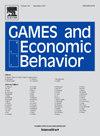Favor exchange with private costs: An experiment
IF 1
3区 经济学
Q3 ECONOMICS
引用次数: 0
Abstract
We conduct an experiment on a two-player infinitely repeated favor exchange game. In the stage game, each player decides whether to provide a favor to the other player. A favor generates a fixed benefit for the recipient and a cost for the provider, which can be either low or high. We study the situation where this cost is private information and it is efficient to provide a favor only when the cost is low. We address two general questions: 1) To what extent do subjects exchange favors in ways that are payoff enhancing, given that private information hinders exchanging favors efficiently? 2) Which strategies do subjects choose and what are the driving forces behind their choices? We focus on Stationary Strongly Symmetric (SSS) strategies, where players play the same strategy after any history, and Equality Matching (EM) strategies, where subjects keep track of the net tallies of favors. We find that overall subjects exchange favors to a relatively large extent and achieve an average payoff-efficiency index exceeding 60%. Although simple strategies, as SSS, are played with the highest frequency, more complex strategies, as EM, explain an important proportion of the data. Subjects' behavior is not always consistent with incentive compatibility or driven by the attainment of higher ex-ante payoffs. The results also suggest that rewarding subjects for trusting and reciprocating might be more acceptable than requiring them to take very costly actions on the equilibrium path, even when it is overall payoff enhancing.
带有私人成本的偏好交换:一项实验
我们在一个两个人无限重复的交换博弈中做了一个实验。在阶段博弈中,每个参与者决定是否向另一个参与者提供帮助。一个恩惠会给接受者带来固定的利益,而给提供者带来成本,这个成本可以低也可以高。我们研究了这种成本为私人信息的情况,只有当成本较低时,提供帮助才是有效的。我们解决了两个一般性的问题:1)考虑到私人信息阻碍了有效地交换好处,受试者在多大程度上以提高回报的方式交换好处?2)受试者会选择哪些策略?他们选择策略背后的驱动力是什么?我们专注于静止强对称(SSS)策略,玩家在任何历史之后都玩相同的策略,以及平等匹配(EM)策略,受试者跟踪青睐的净计数。研究发现,整体主体的交换偏好程度较大,平均回报效率指数超过60%。虽然简单的策略,如SSS,使用频率最高,但更复杂的策略,如EM,解释了重要比例的数据。被试的行为并不总是与激励相容或受到获得较高事前报酬的驱使。结果还表明,奖励被试的信任和回报可能比要求他们在均衡路径上采取非常昂贵的行动更容易接受,即使这是总体回报增强。
本文章由计算机程序翻译,如有差异,请以英文原文为准。
求助全文
约1分钟内获得全文
求助全文
来源期刊

Games and Economic Behavior
ECONOMICS-
CiteScore
1.90
自引率
9.10%
发文量
148
期刊介绍:
Games and Economic Behavior facilitates cross-fertilization between theories and applications of game theoretic reasoning. It consistently attracts the best quality and most creative papers in interdisciplinary studies within the social, biological, and mathematical sciences. Most readers recognize it as the leading journal in game theory. Research Areas Include: • Game theory • Economics • Political science • Biology • Computer science • Mathematics • Psychology
 求助内容:
求助内容: 应助结果提醒方式:
应助结果提醒方式:


